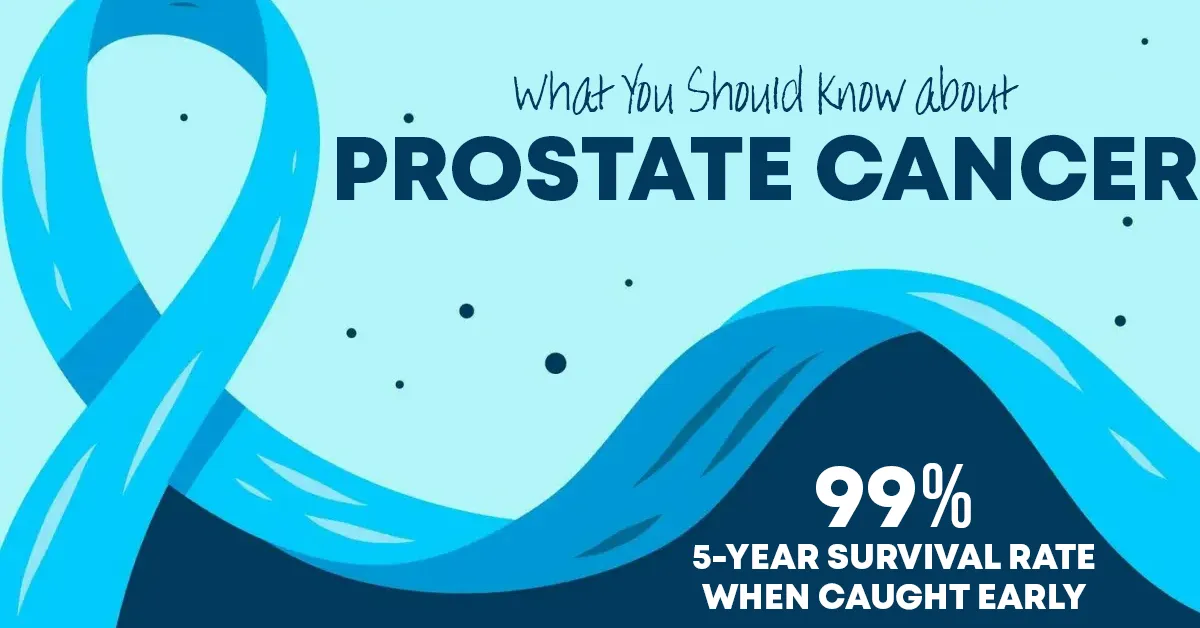September marks Prostate Cancer Awareness Month, making it the perfect time to discuss one of the most common cancers affecting men. With the American Cancer Society estimating 1 in 8 men will have prostate cancer in their lifetime, it is likely you know someone who has had prostate cancer.
What is the Role of Your Prostate in Your Health?
The prostate is a small, walnut-sized gland that plays an important role in male reproductive health.
As men age, the prostate naturally enlarges, which can sometimes cause urinary issues like difficulty starting urination, weak urine flow, or frequent nighttime bathroom trips. While these symptoms don’t necessarily indicate cancer, they’re something you should discuss with your primary care provider.
How is Prostate Cancer Screened?
Screenings for prostate cancer can be done with a physical exam or with a blood test. The blood test measures the amount of prostate-specific antigen (PSA) present in your blood.
Generally, men should consider asking their primary care provider about prostate cancer screening at age 50 for men who are at an average risk. If someone in your immediate family had prostate cancer before age 65, you should consider testing earlier.
It is important to note that if you complete a PSA blood test to screen for prostate cancer, that there are other reasons PSA levels can be elevated. In the event that you have elevated PSA levels, it just warrants additional testing to determine if cancer is present.
What Can You Do to Reduce the Risk of Prostate Cancer?
Age, race, and family history are all aspects of prostate cancer risk that you can not control. However, there are several lifestyle choices may help reduce your prostate cancer risk.
As with many diseases, research suggests that diets rich in fruits and vegetables, particularly those containing lycopene (found in tomatoes), may offer protective benefits. Consider reducing red meat consumption and instead opting for more fish, especially those high in omega-3 fatty acids.
Stay physically active with at least 150 minutes of moderate-intensity exercise per week. This level of exercise can be as simple as a brisk walk.
While obesity may not directly cause prostate cancer, men who are obese have a higher mortality rate from prostate cancer.
Limit high-fat foods: Some studies suggest that diets high in saturated fats may increase prostate cancer risk. Common foods that contain saturated fats include fatty meats, cheese, butter, and many “fast foods.”
While lifestyle changes remain a great way to lower your risk of prostate cancer, regular screening remains the most effective way to catch prostate cancer early when it’s most treatable.
How is Prostate Cancer Treated?
How early someone is diagnosed with prostate cancer influences the treatment options. Often, surgery can be used to remove the prostate, or radiation is used to destroy cancer cells.
Like with most diseases, regular screening is important to get a diagnosis as early as possible, while prostate cancer is still the most treatable. The 5-year survival rate of localized prostate cancer when caught early is 99%, according to the American Cancer Society.
If you are over the age of 50, or have family members who have had prostate cancer, talk to your provider about screening options at your next annual visit.


